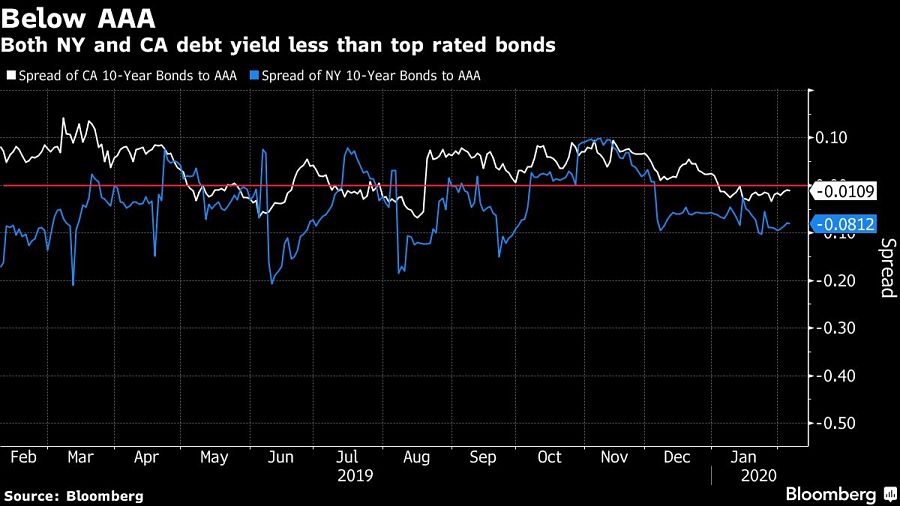

There’s so much money chasing after the bonds sold by America’s high-tax states that buyers don’t seem to care too much about what credit-rating companies think.
The heavy demand has driven municipal yields to their lowest level in more than six decades. And with rates so low, the yield penalties that would typically differentiate a deeply indebted state from a thrifty one have become little more than rounding errors that in some cases contrast with their standing in the ratings pecking order.
California’s general obligation debt, for example, is yielding about 1 basis point less than the AAA benchmark, even though the state is rated as many as four steps below that, according to data compiled by Bloomberg. New York, one step below AAA, is paying about 8 basis points less than top-rated borrowers. Over the past year, New Jersey’s yield premium has been cut nearly in half even though its rating hasn’t changed. Connecticut’s is roughly a third of what it was.

By contrast, bonds issued by AAA rated Texas and Florida, where there’s no state income tax, pay above-benchmark yields.
This dynamic shows how dramatic the demand has become for tax-exempt securities since President Donald J. Trump’s 2017 tax law limited state and local deductions. That change drove investors in high tax-states like California, New York and New Jersey into municipal bonds as an alternative way to drive down what they owe.
“To boil it down, it’s 99.999% because of the SALT cap,” said James Iselin, portfolio manager at Neuberger Berman Group. “Because there is so much demand in the market, there is less of a credit differentiation that the market is making.”

Most firms place a limit on advisors’ sales of alternative investments to clients in the neighborhood of 10% a customer’s net worth.

Those jumping ship include women advisors and breakaways.

Firms in New York and Arizona are the latest additions to the mega-RIA.

The agent, Todd Bernstein, 67, has been charged with four counts of insurance fraud linked to allegedly switching clients from one set of annuities to another.

“While harm certainly occurred, it was not the cataclysmic harm that can justify a nearly half billion-dollar award to the State,” Justice Peter Moulton wrote, while Trump will face limits in his ability to do business in New York.
Orion's Tom Wilson on delivering coordinated, high-touch service in a world where returns alone no longer set you apart.
Barely a decade old, registered index-linked annuities have quickly surged in popularity, thanks to their unique blend of protection and growth potential—an appealing option for investors looking to chart a steadier course through today's choppy market waters, says Myles Lambert, Brighthouse Financial.
